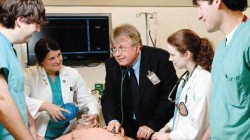Making History
The framework of Louisiana’s healthcare system is being rebuilt from the ground up.
 When Dr. Steve Nelson was appointed as Dean of the Louisiana State University Health Sciences Center School of Medicine in 2007, he was one of the few charged with tackling a daunting challenge: how to rebuild the LSU School of Medicine and New Orleans’ healthcare infrastructure after Hurricane Katrina.
When Dr. Steve Nelson was appointed as Dean of the Louisiana State University Health Sciences Center School of Medicine in 2007, he was one of the few charged with tackling a daunting challenge: how to rebuild the LSU School of Medicine and New Orleans’ healthcare infrastructure after Hurricane Katrina.
Today the healthcare landscape looks very different than it did in 2007, but equally different than how it looked before Katrina. Charity Hospital remains closed, but two new hospitals— the University Medical Center and a new VA—are set to open in 2014 and 2015, respectively. The new facilities will further the reach of what has been deemed the “biomedical corridor,” a 2.4-square mile area in the heart of the downtown medical district. Most importantly, however, is the increased capacity they will provide: 424 hospital beds at LSU and another 200 beds at the VA.
This much-needed capacity translates into gains both for the community, which will have broader access to care, and for the medical school, whose students and residents will get greater exposure to a wide range of patients and medical issues. According to Nelson, this expansion is a critical step forward in the medical school’s mission of preparing doctors for the state of Louisiana, 70 percent of whom train at a LSU facility. As Nelson frequently says, “We are training your doctor right now at LSU.”
Though Nelson recognizes that Hurricane Katrina was a horrible tragedy, he’s tried to make the best out of a tough situation. “In the wake of Hurricane Katrina, we have had the opportunity to re-invent ourselves.” As Nelson says, “The difficult we do immediately. The impossible sometimes takes a bit longer.” We have expanded our clinical practice, re-designed our curriculum and focused our research efforts to address diseases that directly affect our patients – cardiovascular diseases, cancer, stroke and substance abuse. Furthermore, we have expanded our efforts to address the healthcare workforce needs of Louisiana. The city’s progress during the past five years has been rapid and dramatic; the publisher of Forbes called it “one of the great turnarounds in American history.” The healthcare industry has been at the heart of that comeback.
Nelson has been with the LSU Health Sciences Center since the early ’80s, and, to look at his CV, it would seem that he’s had a hand in every major health initiative to hit New Orleans in as much time. For a man who takes on so much, no two days are the same—but that’s just how Nelson likes it. In addition to his role as Dean of the School of Medicine, Nelson continues to be an accomplished physician scientist who has been continuously funded by the National Institutes of Health for over 30 years. “That’s one of the most interesting and challenging aspects of being in medicine and healthcare,” he says.
But Nelson manages to never lose sight of his primary mission: training top-notch doctors for the state of Louisiana. He knows that attracting exceptional medical students from across the region is paramount to that goal. With roughly 200 students (with an average MCAT score of 30 to 31) matriculating from the 3,500 applicants, it’s clear that the LSU program is very strong and widely sought-after.
“There are two types of people,” begins one of Nelson’s favorite sayings, “those who read about history, and those who make history.” He believes the students and the 200 faculty members he’s recruited to study, work and live in New Orleans are part of the latter group. Our faculty are not only outstanding but are committed to the region and its rebirth. “There is incredible opportunity here,” he says. “When people come to visit, they can see and feel the energy. They can tell the healthcare industry in New Orleans is poised for pivotal change.”
As an intensive care unit doctor, Nelson works with patients who are critically ill. “Catastrophic events can happen to anyone at any time,” he says. “When patients come into the ICU, they’re frightened and they feel helpless. One must always remember that what is routine to the doctor is a life-changing event for the patient and their family.” These experiences have profoundly affected Nelson’s philosophy regarding patient care. “I instill in students that we don’t treat diseases; we treat mothers, fathers, brothers, sisters, neighbors. We can teach skills, but being a good physician comes down to much more than skills.”
Nelson keeps a favorite quote within eyesight of his desk, a note from a former patient that reads: “A good doctor treats the disease. A great doctor treats the patient.”
